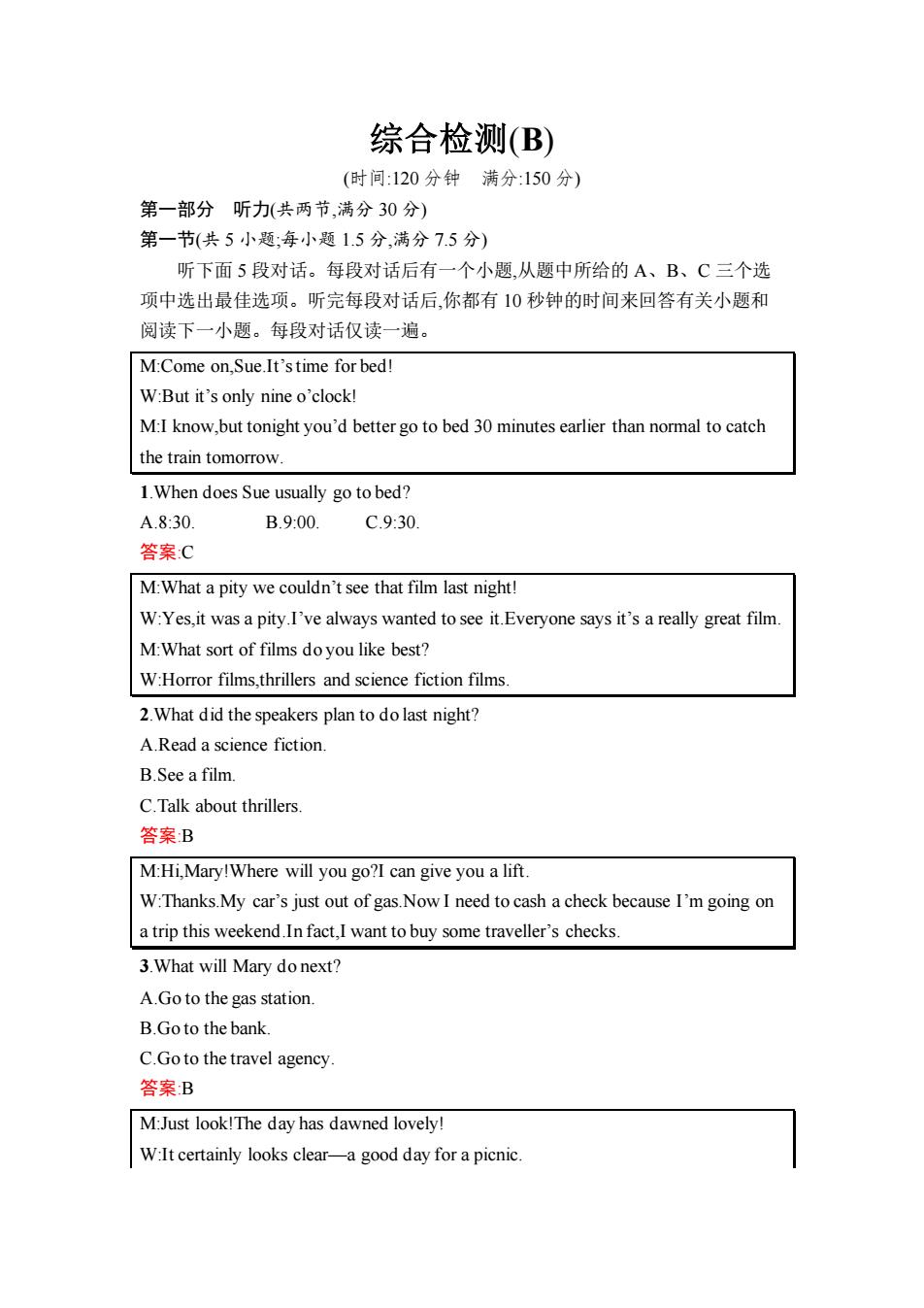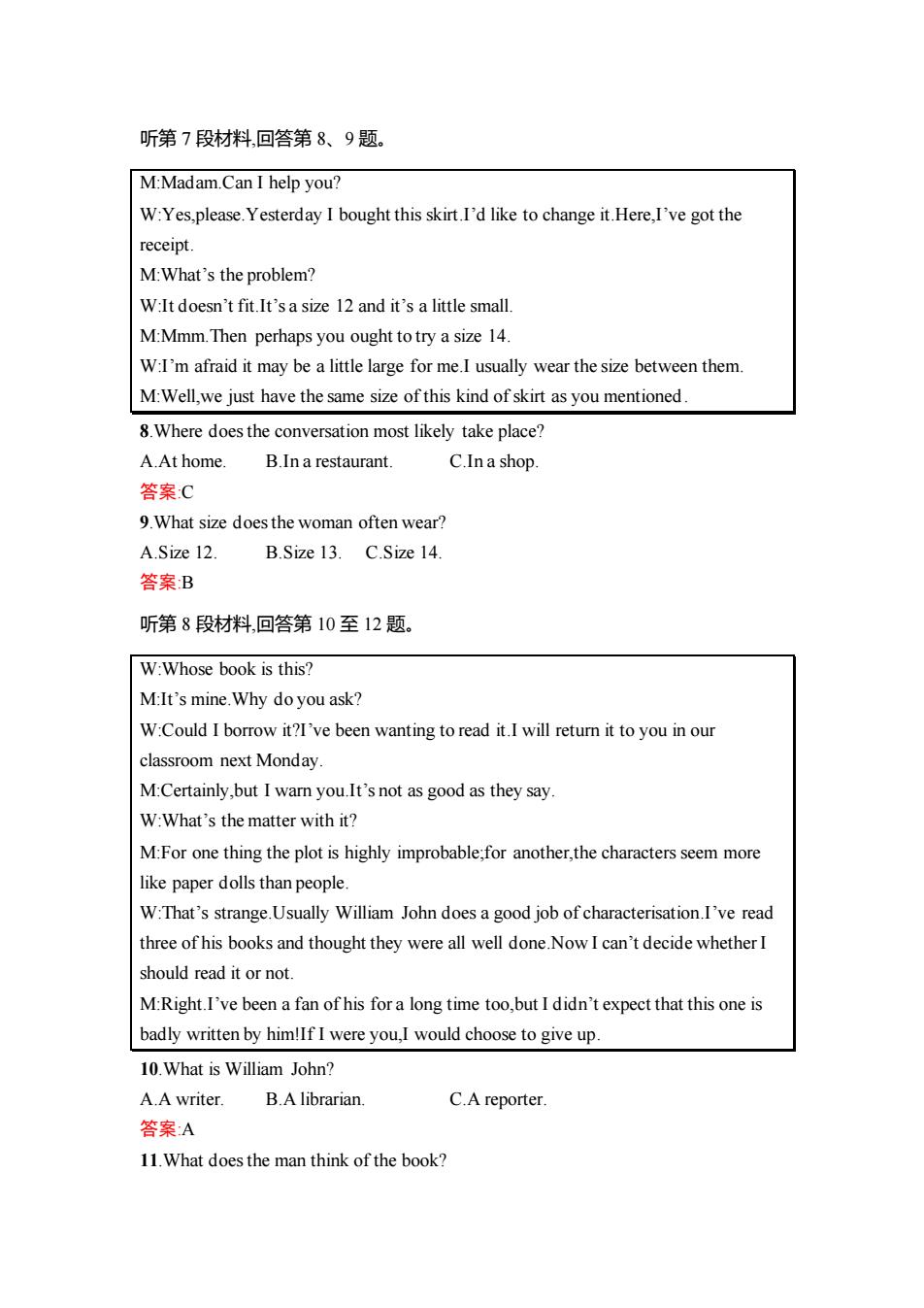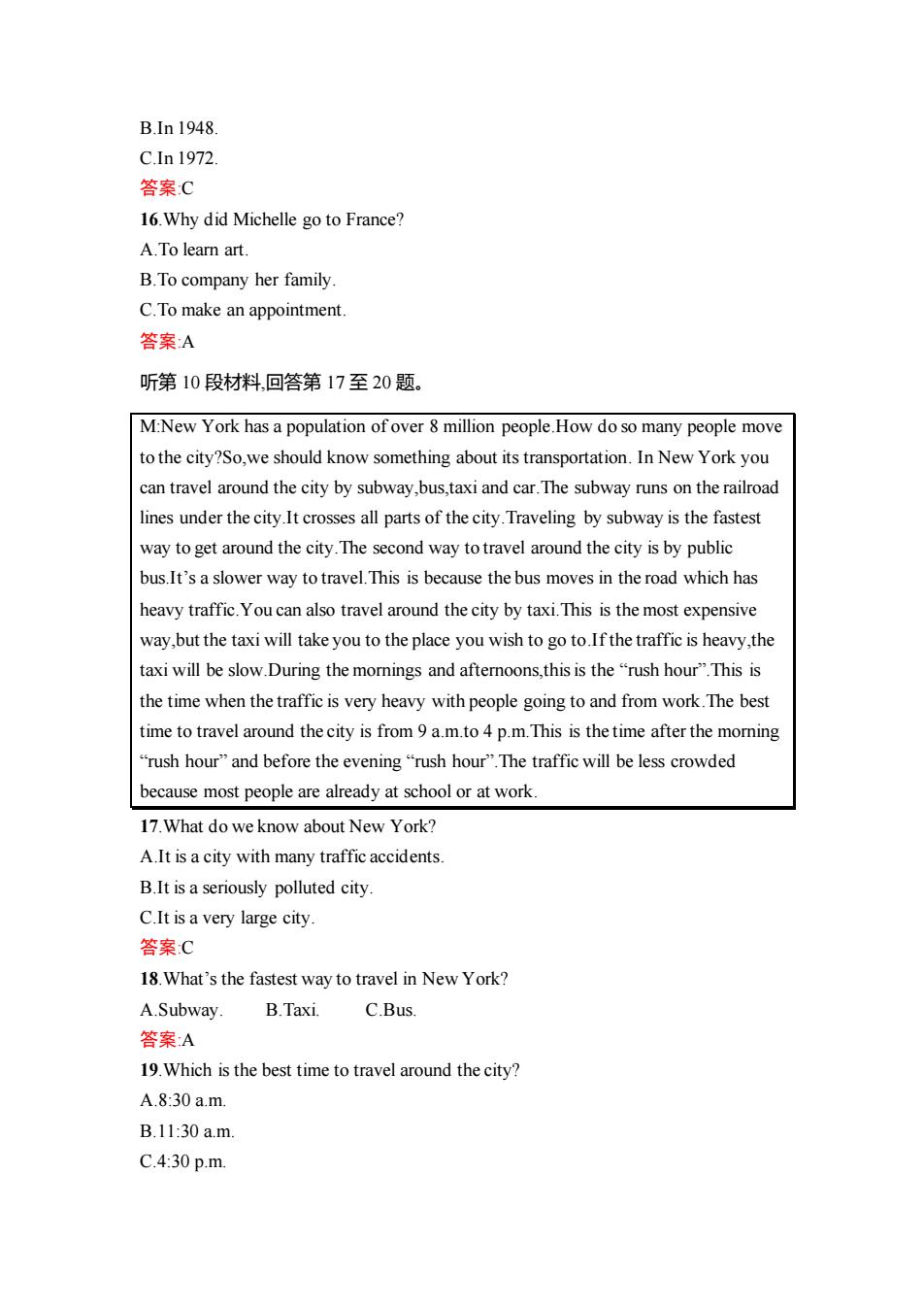
综合检测(B) (时间:120分钟满分:150分) 第一部分听力(共两节,满分30分) 第一节(共5小题:每小题1.5分,满分7.5分) 听下面5段对话。每段对话后有一个小题,从题中所给的A、B、C三个选 项中选出最佳选项。听完每段对话后,你都有10秒钟的时间来回答有关小题和 阅读下一小题。每段对话仅读一遍。 M:Come on,Sue.It's time for bed! W:But it's only nine o'clock! M:I know,but tonight you'd better go to bed 30 minutes earlier than normal to catch the train tomorrow 1.When does Sue usually go to bed? A.8:30 B.900. C.9:30 答案C M:What a pity we couldn't see that film last night! W:Yes,it was a pity.I've always wanted to see it.Everyone says it's a really great film M:What sort of films do you like best? W:Horror films,thrillers and science fiction films. 2.What did the speakers plan to do last night? A.Read a science fiction. B.See a film. C.Talk about thrillers. 答案B M:Hi,Mary!Where will you go?I can give you a lift W:Thanks.My car's just out of gas.Now I need to cash a check because I'm going on a trip this weekend.In fact,I want to buy some traveller's checks. 3.What will Mary do next? A.Go to the gas station. B.Go to the bank. C.Go to the travel agency 答案B M:Just look!The day has dawned lovely! W:It certainly looks clear-a good day for a picnic
综合检测(B) (时间:120 分钟 满分:150 分) 第一部分 听力(共两节,满分 30 分) 第一节(共 5 小题;每小题 1.5 分,满分 7.5 分) 听下面 5 段对话。每段对话后有一个小题,从题中所给的 A、B、C 三个选 项中选出最佳选项。听完每段对话后,你都有 10 秒钟的时间来回答有关小题和 阅读下一小题。每段对话仅读一遍。 M:Come on,Sue.It’s time for bed! W:But it’s only nine o’clock! M:I know,but tonight you’d better go to bed 30 minutes earlier than normal to catch the train tomorrow. 1.When does Sue usually go to bed? A.8:30. B.9:00. C.9:30. 答案:C M:What a pity we couldn’t see that film last night! W:Yes,it was a pity.I’ve always wanted to see it.Everyone says it’s a really great film. M:What sort of films do you like best? W:Horror films,thrillers and science fiction films. 2.What did the speakers plan to do last night? A.Read a science fiction. B.See a film. C.Talk about thrillers. 答案:B M:Hi,Mary!Where will you go?I can give you a lift. W:Thanks.My car’s just out of gas.Now I need to cash a check because I’m going on a trip this weekend.In fact,I want to buy some traveller’s checks. 3.What will Mary do next? A.Go to the gas station. B.Go to the bank. C.Go to the travel agency. 答案:B M:Just look!The day has dawned lovely! W:It certainly looks clear—a good day for a picnic

M:I was thinking the same thing.We have to take time to get some more food,and get things ready 4.What is the man considering? A.Having a picnic. B.Enjoying the good weather. C.Getting some more clothes. 答案:A M:In my country,children start school at the age of 6 or so.At what age do children start school in your country? W:At five. M:Do boys and girls go to school together? W:Yes,they do 5.When do boys start school in the woman's country? A.At7. B.At6. C.At5. 答案:C 第二节(共15小题:每小题1.5分,满分22.5分) 听下面5段对话或独白。每段对话或独白后有几个小题,从题中所给的A、 B、C三个选项中选出最佳选项。听每段对话或独白前,你将有时间阅读各个小 题,每小题5秒钟:听完后,各小题将给出5秒钟的作答时间。每段对话或独白读 两遍。 听第6段材料,回答第6、7题。 M:Go really fast,Cindy! W:I can't.The speed limit here is thirty miles an hour.It's not safe to drive too fast M:What a pity!Maybe I will be late. W:Don't worry.We'll arrive soon.How do you usually get to school? M:I never go to school by car or by bus!I usually walk there. 6.What is the man's opinion about the car? A.It's too slow. B.It's too fast. C.It's unsafe 答案A 7.How does the man usually get to school? A.By car. B.On foot.C.By bus. 答案B
M:I was thinking the same thing.We have to take time to get some more food,and get things ready. 4.What is the man considering? A.Having a picnic. B.Enjoying the good weather. C.Getting some more clothes. 答案:A M:In my country,children start school at the age of 6 or so.At what age do children start school in your country? W:At five. M:Do boys and girls go to school together? W:Yes,they do. 5.When do boys start school in the woman’s country? A.At 7. B.At 6. C.At 5. 答案:C 第二节(共 15 小题;每小题 1.5 分,满分 22.5 分) 听下面 5 段对话或独白。每段对话或独白后有几个小题,从题中所给的 A、 B、C 三个选项中选出最佳选项。听每段对话或独白前,你将有时间阅读各个小 题,每小题 5 秒钟;听完后,各小题将给出 5 秒钟的作答时间。每段对话或独白读 两遍。 听第 6 段材料,回答第 6、7 题。 M:Go really fast,Cindy! W:I can’t.The speed limit here is thirty miles an hour.It’s not safe to drive too fast. M:What a pity!Maybe I will be late. W:Don’t worry.We’ll arrive soon.How do you usually get to school? M:I never go to school by car or by bus!I usually walk there. 6.What is the man’s opinion about the car? A.It’s too slow. B.It’s too fast. C.It’s unsafe. 答案:A 7.How does the man usually get to school? A.By car. B.On foot. C.By bus. 答案:B

听第7段材料,回答第8、9题。 M:Madam.Can I help you? W:Yes,please.Yesterday I bought this skirt.I'd like to change it.Here,I've got the receipt. M:What's the problem? W:It doesn't fit.It's a size 12 and it's a little small. M:Mmm.Then perhaps you ought to try a size 14. W:I'm afraid it may be a little large for me.I usually wear the size between them. M:Well,we just have the same size of this kind of skirt as you mentioned 8.Where does the conversation most likely take place? A.At home.B.In a restaurant. C.In a shop. 答案C 9.What size does the woman often wear? A.Size 12. B.Size 13.C.Size 14. 答案B 听第8段材料,回答第10至12题。 W:Whose book is this? M:It's mine.Why do you ask? W:Could I borrow it?I've been wanting to read it.I will return it to you in our classroom next Monday. M:Certainly,but I warn you.It's not as good as they say. W:What's the matter with it? M:For one thing the plot is highly improbable;for another,the characters seem more like paper dolls than people. W:That's strange.Usually William John does a good job of characterisation.I've read three of his books and thought they were all well done.Now I can't decide whether I should read it or not. M:Right.I've been a fan of his for a long time too,but I didn't expect that this one is badly written by him!If I were you,I would choose to give up. 10.What is William John? A.A writer. B.A librarian. C.A reporter. 答案A 11.What does the man think of the book?
听第 7 段材料,回答第 8、9 题。 M:Madam.Can I help you? W:Yes,please.Yesterday I bought this skirt.I’d like to change it.Here,I’ve got the receipt. M:What’s the problem? W:It doesn’t fit.It’s a size 12 and it’s a little small. M:Mmm.Then perhaps you ought to try a size 14. W:I’m afraid it may be a little large for me.I usually wear the size between them. M:Well,we just have the same size of this kind of skirt as you mentioned. 8.Where does the conversation most likely take place? A.At home. B.In a restaurant. C.In a shop. 答案:C 9.What size does the woman often wear? A.Size 12. B.Size 13. C.Size 14. 答案:B 听第 8 段材料,回答第 10 至 12 题。 W:Whose book is this? M:It’s mine.Why do you ask? W:Could I borrow it?I’ve been wanting to read it.I will return it to you in our classroom next Monday. M:Certainly,but I warn you.It’s not as good as they say. W:What’s the matter with it? M:For one thing the plot is highly improbable;for another,the characters seem more like paper dolls than people. W:That’s strange.Usually William John does a good job of characterisation.I’ve read three of his books and thought they were all well done.Now I can’t decide whether I should read it or not. M:Right.I’ve been a fan of his for a long time too,but I didn’t expect that this one is badly written by him!If I were you,I would choose to give up. 10.What is William John? A.A writer. B.A librarian. C.A reporter. 答案:A 11.What does the man think of the book?

A.Well done.B.Disappointing. C.Strange. 答案B 12.What does the man advise the woman to do in the end? A.Read the book B.Quit reading the book. C.Read other three books. 答案B 听第9段材料,回答第13至16题。 M:Good morning,Michelle.My name is Jack Smith.I'm very glad to have this opportunity to do the interview. W:Good morning,Mr Smith. M:Frankly speaking,I am always one of your loyal fans.I think that many people,like me,have seen some of your famous paintings.Your recent works have also had a great influence on people,especially those college students who learn art.So I am very curious about your experience of growth.When and where were you born? W:I was born in Sydney on October 2nd,1950. M:Is that where you lived all your childhood? W:Yes,I lived there all my childhood. M:Mmm.How long have you been in Britain? W:Oh,I've been here since we married in 1972. M:Why did you come here? W:I married an Englishman!It was quite a romantic situation 48 years ago.I had to go to France in order to study art,and we met there.Later,we married in Britain and settled down here. 13.What is the probable relationship between the speakers? A.Customer and shopkeeper. B.Teacher and student. C.Reporter and artist. 答案C 14.Where did Michelle and her husband meet for the first time? A.Australia. B.France.C.Britain. 答案B 15.When did Michelle move to Britain? A.In1950
A.Well done. B.Disappointing. C.Strange. 答案:B 12.What does the man advise the woman to do in the end? A.Read the book. B.Quit reading the book. C.Read other three books. 答案:B 听第 9 段材料,回答第 13 至 16 题。 M:Good morning,Michelle.My name is Jack Smith.I’m very glad to have this opportunity to do the interview. W:Good morning,Mr Smith. M:Frankly speaking,I am always one of your loyal fans.I think that many people,like me,have seen some of your famous paintings.Your recent works have also had a great influence on people,especially those college students who learn art.So I am very curious about your experience of growth.When and where were you born? W:I was born in Sydney on October 2nd,1950. M:Is that where you lived all your childhood? W:Yes,I lived there all my childhood. M:Mmm.How long have you been in Britain? W:Oh,I’ve been here since we married in 1972. M:Why did you come here? W:I married an Englishman!It was quite a romantic situation 48 years ago.I had to go to France in order to study art,and we met there.Later,we married in Britain and settled down here. 13.What is the probable relationship between the speakers? A.Customer and shopkeeper. B.Teacher and student. C.Reporter and artist. 答案:C 14.Where did Michelle and her husband meet for the first time? A.Australia. B.France. C.Britain. 答案:B 15.When did Michelle move to Britain? A.In 1950

B.In1948. C.In1972. 答案C 16.Why did Michelle go to France? A.To learn art. B.To company her family. C.To make an appointment. 答案A 听第10段材料,回答第17至20题。 M:New York has a population of over 8 million people.How do so many people move to the city?So,we should know something about its transportation.In New York you can travel around the city by subway,bus,taxi and car.The subway runs on the railroad lines under the city.It crosses all parts of the city.Traveling by subway is the fastest way to get around the city.The second way to travel around the city is by public bus.It's a slower way to travel.This is because the bus moves in the road which has heavy traffic.You can also travel around the city by taxi.This is the most expensive way,but the taxi will take you to the place you wish to go to If the traffic is heavy,the taxi will be slow.During the mornings and afternoons,this is the"rush hour".This is the time when the traffic is very heavy with people going to and from work.The best time to travel around the city is from 9 a.m.to 4 p.m.This is the time after the morning "rush hour"and before the evening "rush hour".The traffic will be less crowded because most people are already at school or at work. 17.What do we know about New York? A.It is a city with many traffic accidents. B.It is a seriously polluted city. C.It is a very large city. 答案C 18.What's the fastest way to travel in New York? A.Subway. B.Taxi. C.Bus. 答案A 19.Which is the best time to travel around the city? A.8:30a.m. B.11:30a.m C4:30p.m
B.In 1948. C.In 1972. 答案:C 16.Why did Michelle go to France? A.To learn art. B.To company her family. C.To make an appointment. 答案:A 听第 10 段材料,回答第 17 至 20 题。 M:New York has a population of over 8 million people.How do so many people move to the city?So,we should know something about its transportation. In New York you can travel around the city by subway,bus,taxi and car.The subway runs on the railroad lines under the city.It crosses all parts of the city.Traveling by subway is the fastest way to get around the city.The second way to travel around the city is by public bus.It’s a slower way to travel.This is because the bus moves in the road which has heavy traffic.You can also travel around the city by taxi.This is the most expensive way,but the taxi will take you to the place you wish to go to.If the traffic is heavy,the taxi will be slow.During the mornings and afternoons,this is the “rush hour”.This is the time when the traffic is very heavy with people going to and from work.The best time to travel around the city is from 9 a.m.to 4 p.m.This is the time after the morning “rush hour” and before the evening “rush hour”.The traffic will be less crowded because most people are already at school or at work. 17.What do we know about New York? A.It is a city with many traffic accidents. B.It is a seriously polluted city. C.It is a very large city. 答案:C 18.What’s the fastest way to travel in New York? A.Subway. B.Taxi. C.Bus. 答案:A 19.Which is the best time to travel around the city? A.8:30 a.m. B.11:30 a.m. C.4:30 p.m